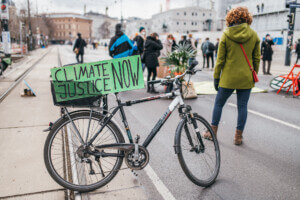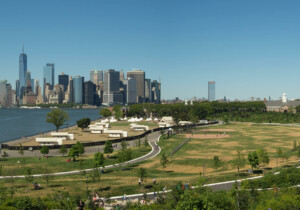As communities look to batten down the hatches in preparation for rising seas and extreme future weather events exacerbated by climate change, numerous major infrastructural projects—spread across 13 cities and states—are now at risk of being abandoned or left unfinished due to construction delays-prompted by the coronavirus pandemic.
As the New York Times recently reported, various projects, ranging from Dutch-style sea gates to storm surge-blocking earthen berms to complex pump systems designed to alleviate street flooding, could be scrapped as state and local officials sound the alarm that they will fail to meet the conditions set forth by a U.S. Department of Housing and Urban-funded program.
Established during the wake of Hurricane Sandy by the Obama administration, the National Disaster Resilience Competition stipulates that the funding for community-fortifying climate projects—$1 billion doled out in total—must be spent in its entirety by each recipient by 2022. If not, any remaining funds awarded to cities and states would be forfeited, a move that could potentially prevent in-progress work from being completed. States and cities participating in the program include Louisiana (and the city of New Orleans), Iowa, Virginia, California, and both New York City and New York state.
Per the Times, a group of officials from these cities and states has asked Congress to extend the deadline by three years to 2025, so that full funding remains intact. However, the fate of these projects could ultimately lay in the hands of Republican lawmakers, most of whom have demonstrated themselves to be antagonistic toward climate resiliency as they aid in the loosening of restrictions on major polluters and other environmental regulations.
Some projects, such as a $36 million storm wall “meant to blend into the landscape” while protecting a low-income neighborhood in Bridgeport, Connecticut, are still in the early design and environmental review phases. Work on that project was slated to kick off in early 2021 and finish, just under the clock, by the end of the year to receive full funding in accordance with the conditions of the program. That timeline, however, is now in doubt.
“All of these projects, all 13 of them, are very complex,” Pat Forbes, executive director of Louisiana’s Office of Community Development, told the Times, noting that the pandemic has impeded the progress of already complex and time-intensive projects. This includes completed work on a $48 million community being built for the former residents of Isle de Jean Charles, a coastal Louisiana village that was rendered inhabitable after being devoured by the Gulf of Mexico. Forbes is overseeing the ambitious resettlement project, which was supposed to wrap up at the end of 2031. “They are the types of projects that do take longer to develop and construct,” he said.











